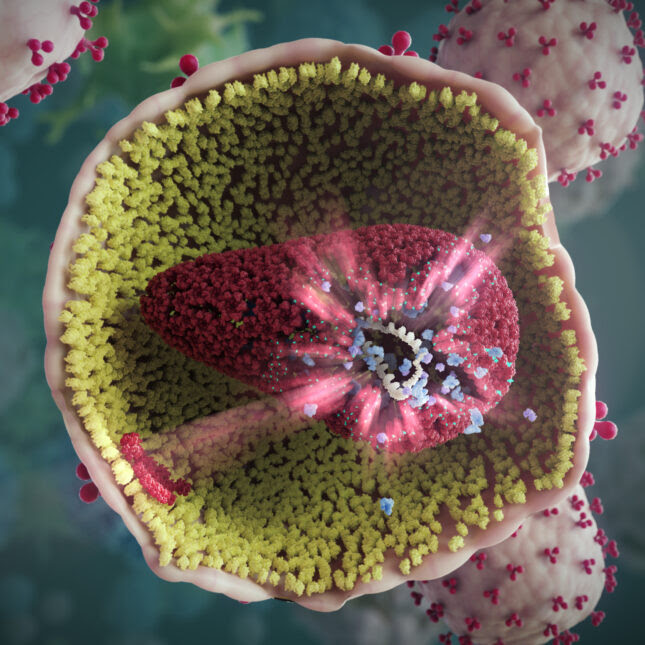By NATALYA ORTOLANO @NatOrtolanoJULY 1, 2020

An experimental new HIV treatment could, with just one dose, reduce the amount of virus in an infected person for up to six months. But experts aren’t convinced the advance will significantly change how we treat HIV anytime soon.
A group of researchers from Gilead Sciences developed a new drug dubbed lenacapavir, described Wednesday in Nature, that targets an HIV protein called capsid that has been nearly untargetable until now. Targeting capsid weakens the HIV virus’ outer coating, making it harder for the virus to infect our cells or protect itself from our body’s defenses. Current HIV treatments — which most patients must take daily — target proteins involved in the early stages of the virus’ life cycle, but targeting capsid affects multiple phases.
Experts are hesitant to use this drug alone in the clinic if it is approved. Patients are currently prescribed a combination of antiretrovirals that target different HIV proteins — a way to prevent HIV from becoming resistant to the treatment. Gilead is still hoping it can develop other long-acting antiretrovirals that could be given to patients in combination with lenacapavir, according to Martin Rhee, the company’s director of clinical research.
I have high “hopes for it to go through to the clinic and have another arrow in the quiver for treatment of HIV,” said Sumit Chanda, director and professor of the Immunity and Pathogenesis Program at the Sanford Burnham Prebys Medical Discovery Institute, who was not involved in Gilead’s research.
Related: ‘Flying blind’: Doctors race to understand what Covid-19 means for people with HIV
Right now, nearly everyone with HIV — about 1.2 million people in the United States — takes a combination antiretroviral pill every single day.
But taking a pill every day isn’t always easy. One missed pill lets the virus replicate just a little bit, and when patients miss their dose too often, HIV can become resistant to the drug. Rhee, the Gilead director and one of the authors on the study, claims patients also report personal issues with the daily pill.
“You may need to sometimes take the pill in front of other people or have to go to the pharmacy to get the pill. And some people would rather do it more discreetly. Taking a pill for HIV can be associated with a lot of stigma. And so, long-acting regimens can remove that stigma for people. And so that’s why we are working on developing long-acting agents,” he said.
Lenacapavir directly addresses these concerns — 40 healthy individuals injected with the drug still had traces of the drug in their system up to six months later. Treatment in 32 HIV-positive patients treated with low concentrations of the drug significantly reduced the amount of virus after only nine days. The 40 healthy individuals recruited were 19-44 years old — 13% were female and 11% were Black. None of the 32 HIV infected patients were female, and 3% were Black.
But lenacapavir has its drawbacks. Initial studies in a dish revealed that some strains of HIV may be slightly resistant to the treatment. That’s true with current therapies, too — which is why the different antiretroviral drugs are given in combination, to help ensure they target multiple phases of the virus’ life cycle and prevent drug resistance.
phases of the clinical trial.
“You have a single drug here, which looks fantastic, but [it] has potential capacity for resistance, so that’s a big question mark. Can we find long-acting antiretrovirals that they can give in combination? That will ensure that resistance is not going to be an issue,” said Chanda, the Sanford Burnham researcher.
Rhee explained that using the drug alone is not Gilead’s long-term plan. They are developing long-acting drugs against other HIV proteins to combine with Lenacapavir.
Baird analyst Brian Skorney also pointed out this treatment is “a step, not a leap.” Current treatments for HIV are highly effective, and convincing doctors to switch to a new treatment may be a hard sell, he said. But predicting the next big thing in HIV treatment is nearly impossible — and Gilead will want to maintain its status as a leader in the field.
“Whether or not this becomes a commercial opportunity, a very profitable opportunity for them, I think they want to be there to create as many options and to continue to help spearhead the evolution of HIV treatment. And I think this is one of the ways that at minimum is helping to evolve the treatment paradigm and helping to provide patients with more and more options,” he said.

Leave a Reply